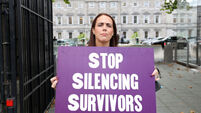'We need to talk to 13-year-olds about sexual harassment — waiting until third-level is too late'

'At least if we talk to first years before the worst happens, then they might have that education up through school, but nobody wants me to talk to the 13-year-olds.'
At the beginning of May, the Uachtarán of the Irish Second-level Student's Union (ISSU) Emer Neville spoke on behalf of school students at the Oireachtas committee on gender equality.
Ms Neville, along with ISSU equality officer Saoirse Exton, was there to discuss gender stereotypes, gender-neutral career advice, and the current Relationships and Sexual Education (RSE) curriculum.













